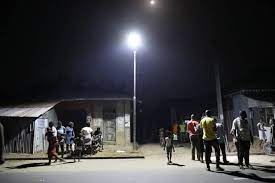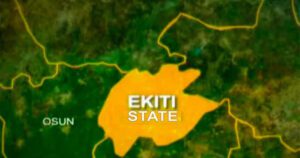
Blackout: Ogun students study for exams under solar-powered streetlight
In this report, Samuel Omotere writes about the daunting challenges faced by Ogun students, who strive to study for exams in blackouts in order to achieve academic success.
In an era dominated by digital learning, where students utilize a range of technological tools to enhance their education, higher institution learners in Ogun state may find it difficult to access them timely, due to the inconsistent power supply in their host areas.
This is not as disappointing as their fate of studying in the blackout with lights like lantern light, candlelight, torchlight, or the feeble rays of solar street lights to prepare for their upcoming semester exams.
The examination period, the most anticipated time in academic institutions, is a crucial phase when students must review all their educational materials and delve deeper into theories and class lectures to prepare thoroughly.
The students who are fond of reading in groups assemble wherever electricity is available to prepare for their exams. They are usually found in places like charging centres, salons, and even under the community streetlights.
These students from Abraham Adesanya Polytechnic, located in the Ijebu-Igbo area of Ogun State, are well aware of the challenges that come with tertiary education, which often amplifies their fear of failure.
Speaking with these students in separate interviews, it was gathered that they have not had power in the area since last year, and when electricity is available, it is erratic and hardly beneficial. They take their mobile gadgets to school to charge them with the electricity provided by the school generator.
Under the community street light in Oke Ife, Ijebu-Igbo, students from immediate houses bring out their various learning materials and study.
Their action was said to be as a result of the inadequate power supply in the institution’s area, forcing them to find alternative study spaces for their rigorous exams, where strict invigilation leaves no room for malpractice.
Ademola Micheal, a student at the aforementioned institution told this reporter that studying under the streetlight for their night study sessions might be inconvenient but the light is of great advantage.
“We need to study hard so we would not fail any course and also due to the type of invigilators that will supervise us, their identities are not disclosed yet, so we just need to do the right thing because we do not want to fail.
“We do not have any choice than to study anywhere we observe there is power, most especially the streetlight. The reading is done under the streetlight for us to be able to see properly”, Micheal said.
Another student, Boluwatife Obaowo from Abraham Adesanya Polytechnic added that his colleagues leverage on the brightness from the streetlight, which is at the front of their hostel to read.
“The streetlight is at the front of their hostel, Hope Villa, so they read with it. The fact is there is blackout here, so during exams, people read anywhere there is light, their intent might be to power their mobile gadgets but they study with the light.
“Students also read at the front of charging centres because of the light in those locations. I pay One thousand, six hundred naira (N 1,600), per year, so estimate the vat of light”, he said.
When we thought this culture of studying under streetlights ended with students of Abraham Adesanya Polytechnic in Ijebu-Igbo, Adesemowo Oluwapelumi, a student of Moshood Abiola Polytechnic in Abeokuta, made a jabbing revealation that utilizing solar streetlights for reading educational materials is a common practice in Oluwo Community and its environs, especially during examination periods, due to its advantages.
Oluwapelumi said, “Most students go their friends’ houses that have generator, while some go to the street because of streetlight. We have street light in Oluwo, Ita Eko, and Obada.
“Honestly, the blackout is not helping because they send our sitting arrangement to our Whatsapp group chats. How is someone with flat battery expected to be notified about the development?
“Some even come to the examination hall late with the excuse that their phone battery is flat.”
Ibrahim Oguntade, a student of Tai Solarin University of Education (TASUED), in Ijebu-Ode lamented that the issue of electricity is one of the issues students have to deal with during exams.
“Not even examination period alone, students need electricity to read for test and have their assignment done, which is a major issue in the school and its environment. Even if we want to use our mobile phone to read during examination, we will have to charge it alongside other gadgets at exorbitant prices .
“Students, especially those living in rural locations, will have to walk far distance to be able to charge their phones, some even visit their friends’ house just to charge
“Solar powered street lights are not rampant in the university’s host communities, it is when you have it around that students can think of reading with them but some read with candles.
“It is uncomfortable to read when there is no light, especially for students that love to study for exams in the night, and some might not be able to assimilate easily”, he said.
- Impacts of poor power supply on students’ performance
Ishola Adebayo, a lecturer in an Ogun Public University, noted that inadequate power supply significantly impacts students’ performance. He said it raises concerns that can lead to mental distractions, which may cause students to lose concentration on their studies.
He said lack of electricity often results in a mental blackout for students, where the emotional turmoil experienced before they struggle to start studying can disrupt concentration, making it challenging for students to cope with their studies.
“Students just concluded their examination and there was total blackout, the hours they are supposed to use to read, they will spend a whole lot of time looking for where to power their phone so they can use it as a research tool.
“A total blackout leads to mental blackout. The emotional imbalance they will go through, they will not be able to concentrate, battle with tough examination questions. For students studying mathematics and even economics, they will need this light,” he said.
Adebayo addresses the challenges students face in blackout due to financial constraints, he opined that these issues causes stress and mental strain, which negatively impact their academic performance. He calls for the concerned body to address these critical issues to improve students’ learning conditions.
He said, “For example, my campus do not accept night reading so students are left on their own to do their personal reading but all of these hostels are in total blackout. Where do you expect someone that has not eaten to buy generator or fuel?”
The Educationist also advised against using candles to study, due to the risk of fire, climate change concerns and health hazards associated with emissions from the flames.
However, he frowned at the usage of streetlight for reading, by pointing out the potential dangers. Students cannot continue to sit on the road where there is streetlight, when a lot of things can happen in the night with the insecurity. The options are not totally welcomed by me, who will say students should walk at night to use the streetlight to read, it does not guarantee the safety of the student.
Adebayo concluded that students can buy rechargeable lamps or contribute money in groups to buy generator for their study sessions, because amidst all the problem, they still need to excel in their exams. His recommended solution is consistent 24-hour power supply for students across the nation to facilitate a safe and conducive learning environment.
Effects of reading with candle lights and torchlight
An Ophthalmologist at Asiwaju Bola Ahmed Tinubu Health Centre, Amarachi Amadi, said the eyes needs light to function, because with proper illumination, the eyes is relaxed, and it can see properly and focus on what it wants to focus on, but under dim illumination (Candle, Torchlight),the eyes is stressed.
She stated that in the structure of the eyes, there is what we call ciliary muscle, ciliary body and the lens, the lens in the cartesian part of the eyes, inside the eyes, the part that gets affected with cataracts is supposed to be transparent and it is flexible, it changes its shape when light passes through it so that it will focus its light on what one is focusing on, either far or near distance.
“That lens is held by ciliary muscle and the ciliary body, when we are looking at far distance, it makes the lens more curvy. The duty of the cilary muscle is to contract the lens so that it will focus the light, when there is no enough light for the lens to direct the light to retina, it stresses the muscle and it starts having issues like myopia.”
She advised that people read with good light regardless of their age, because naturally the eyes gets old just as the skin gets wrinkled, “Once we get older, the ciliary body and the ciliary muscle start becoming weak, they do not contract the lens”, but noted that there are some people that escape that condition for sometimes, and “when you now have poor lighting, it is as if you are making the matter worse.”
“If you are in a part of the country where electricity is bad, for instance you are a student and you do not have money to buy fuel in your generator, and you want to use your torchlight, I will advise them to get those bright LED torchlight, because they have high illumination. If they cannot afford that, they can get the normal rechargeable lantern and it should be more than one, so that there will be enough illumination to avoid them straining their eyes. LED torchlight, once charged, there are very bright and clear, no shadows.
“On reading with solar powered street light, the pole is way up, you have to go under it but when the light is close to you, you can direct it straight to what you want to read. Although it is bright but the bulb is up on the pole, except if there are plenty solar powered streetlights, so all the light makes everywhere bright.
“Streetlight is bright but it is way high up, the distance from one pole to the other is far, I do not believe the light will be bright enough to concentrate to what you are reading. To me I do not see it as a better source”, Amadi concluded.
- The DisCo is facing supply issues – IBEDC
In an interview with the IBEDC spokesperson, Busolami Tunwase, said the DisCo is currently facing supply issues as a result of the low allocation it is receiving from the national grid.
She also blamed the poor power supply on vandalism in areas they are covering.
Tunwase said, “The tertiary institutions’ areas are not peculiar from the Nigerian communities; if there are no supplies across, there are no supplies. It is an issue of allocation and vandalism; it applies to every area we are covering.
“Some of the solutions IBEDC is coming up with right now, on the issue of vandalism, we will set up a transformer repair workshop to make sure that such are rectified on time.
“We are working with some independent power producers to take care of some areas where we are having challenges, in terms of communities that are underserved.
“From the remit of our control, the stakeholders in the power sector are working together to make sure these challenges are resolved on time.
“On the issue of vandalism, we are strengthening our security, and I am calling on communities to please join hands with us to make sure these vandals are apprehended.”
We are working on solutions – Government
The Ogun Commissioner of Education, Science and Technology, Abayomi Arigbabu, during a telephone interview with this correspondent, said that poor power supply is not peculiar to higher institutions and the government is working on a wayforward.
“There is poor power situation in the country generally, so why will someone be talking about poor power situation in tertiary institutions?. You cannot even blame the school, these students live outside the school, in communities.
“It is not peculiar to tertiary institutions alone. Are they going to put solar lights in communities students are, so they can have light?
“There is general electricity problem in the country, everyone knows that, which the state and federal government is working on.
“When I was in school I also used lantern, so that is not a big deal. People use lantern, even now the type of lantern they use is better than the one we used, people use rechargeable lamp, solar lantern. Do not let us make mountain out of molehill, let us talk about issues that is germane,” Arigbabu said.




